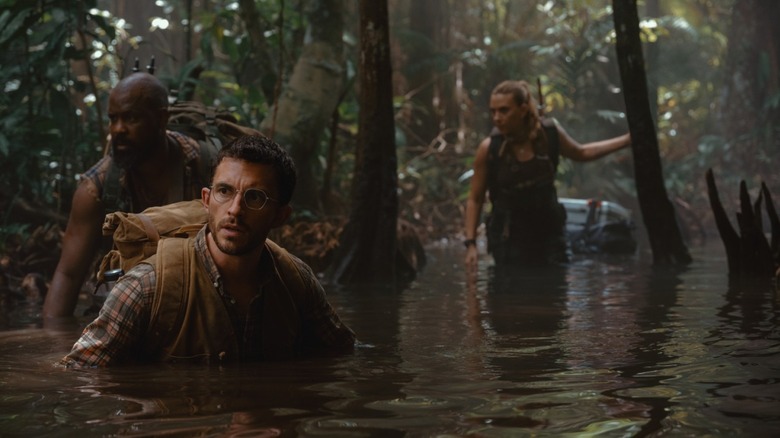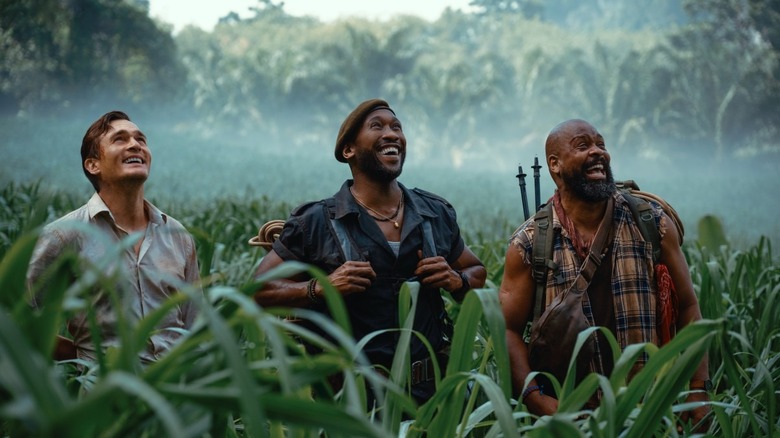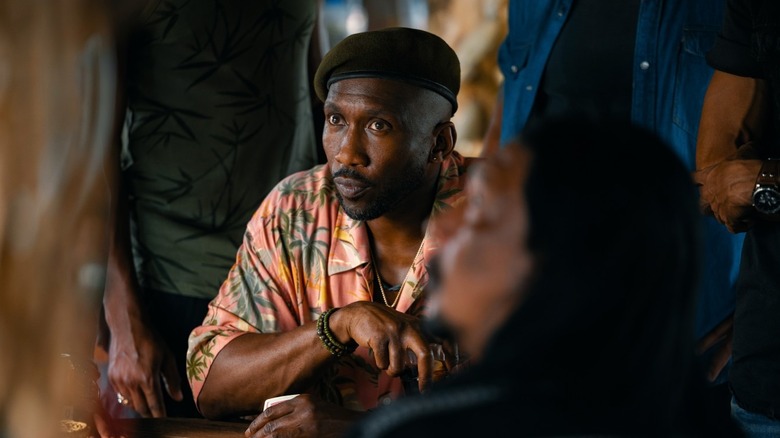Jurassic World Rebirth Betrays The Franchise With One Awful Choice
This article contains spoilers for "Jurassic World Rebirth."
"Jurassic World Rebirth" is a strange movie. On the one hand, it's a lean, back-to-basics dino flick and is certainly better than the atrocity that was "Jurassic World Dominion." On the other hand, it's still a rather disappointing movie and illustrates the inherent limits of the larger "Jurassic" franchise with its basic, dull plot and uninteresting characters.
At its worst, "Rebirth" shares a lot of similarities with the worst impulses of the American MonsterVerse movies. Specifically, it spends too much time focusing on humans rather than the creatures audiences are here to see. It also feels the need to force some unnecessary kid characters into the story, which mostly ends up distracting from the stuff that's actually fun and cool.
Even at its best, however, "Rebirth" struggles to do a whole lot with its most fascinating concepts, like an island full of mutant dinosaurs. But more than that, it commits a cardinal sin that betrays the larger "Jurassic" property. Writer David Koepp should know better, given he wrote the first two films in the franchise, yet for some reason he makes the "heroes" of "Rebirth" — that is, the characters audiences are supposed to care about and sympathize with — the type of individuals that would've been the villains in any other "Jurassic" movie.
Jurassic World Rebirth focuses on the wrong characters
In "Jurassic World Rebirth," we follow Zora Bennett (Scarlet Johansson), a covert operation expert, as she assembles a team to travel to the island that was used for experimenting on new mutant dinosaurs before the opening of Jurassic World. Their mission: To collect dino blood samples that could hold the key to possible life-saving medicine. Said crew consists of Duncan Kincaid (Mahershala Ali), Bobby Atwater (Ed Skrein), Leclerc (Bechir Sylvain), and Nina (Philippine Velge), all of whom are being paid handsomely by the pharmaceutical rep Martin Krebs (Rupert Friend).
The only person on the team who isn't a mercenary is Dr. Henry Loomis (Jonathan Bailey), a paleontologist who once worked under Dr. Alan Grant (Sam Neill) and the heart and soul of the team. In order to compensate for the rest of the crew, Loomis is not just a dinosaur nerd; he's the purest soul in the entire franchise, an extremely innocent guy who believes they can easily just not deliver the blood samples to the greedy Big Pharma guy and instead open source the data they find and allow the world-changing medicine to be available to everyone.
Truly, Loomis has to be exceptionally good to make up for what's without a doubt the worst group of protagonists in a "Jurassic" movie ever. The fact that they're all mercenaries, people who worked in war zones, or individuals who engaged in sabotage (and who knows what else), and are extremely okay with merely killing dinosaurs goes against everything the "Jurassic" films are about.
Sad backstories do not make up for Rebirth's terrible heroes
The "Jurassic" movies have always been about humanity playing god and abusing the natural world and animals. In "The Lost World: Jurassic Park," every soldier and mercenary is brutally killed in a satisfying way, and we as the audience are meant to hate them. Even in the original "Jurassic Park," Bob Peck's game warden, Robert Muldoon, is memorably slaughtered by Velociraptors. Sure, he helped out the main characters and saved Laura Dern's Ellie Sattler, but he is still a hunter and gets taken down by his own would-be prey.
As bad as the previous "Jurassic World" movies could (and do) get, they at least understood this, and every mercenary, hunter, trafficker, and even soldier in those films mauled, devoured, gored, or clawed to death by dinosaurs. The sole exception is Owen Grady (Chris Prat), a former member of the U.S. Navy who, from day one, is shown to be against any use of the animals as weapons or commodities.
"Rebirth," on the other hand, has nothing to say about its cast of mercenaries. As surprised or intimidated as Loomis is when he learns about their pasts, he shares no opinions on the matter. The only time the audience is encouraged to be judgmental is toward Atwater, who actively wants to kill a dino or two just because he can. Koepp even feels the need to give Zora and Duncan tragic backstories in order to make them more sympathetic to the audience, as if having lost people they love makes their previous violent deeds more acceptable.
It's why the ending to the theatrical cut of "Rebirth" feels so disingenuous, because it assumes the audience would feel bad if one of the people who would be the villains in any other "Jurassic" movie died. It's fine to change up the formula after seven films. It's a whole other thing to abandon the core themes and message of the entire franchise to try and get audiences to care about a group of bad guys.
"Jurassic World Rebirth" is currently playing in theaters.


